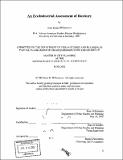| dc.contributor.advisor | Dara O'Rourke. | en_US |
| dc.contributor.author | Williamson, Jesse Daniel, 1972- | en_US |
| dc.contributor.other | Massachusetts Institute of Technology. Dept. of Urban Studies and Planning. | en_US |
| dc.coverage.spatial | n-us-ma | en_US |
| dc.date.accessioned | 2012-05-15T21:08:55Z | |
| dc.date.available | 2012-05-15T21:08:55Z | |
| dc.date.copyright | 2002 | en_US |
| dc.date.issued | 2002 | en_US |
| dc.identifier.uri | http://hdl.handle.net/1721.1/70745 | |
| dc.description | Thesis (M.C.P.)--Massachusetts Institute of Technology, Dept. of Urban Studies and Planning, 2002. | en_US |
| dc.description | Includes bibliographical references (p. 67-68). | en_US |
| dc.description.abstract | Industrial Ecology (IE) is a growing body of knowledge and theories regarding the environmental impacts of human activities. It is intended to bring some lessons from the natural ecology to bear on the functioning of our industrial and economic systems. Materials exchange is a specific kind of IE where the waste output of one business becomes the input material for another, reducing disposal into landfills and resulting in positive benefits, economic and otherwise, for those involved. This study was intended to examine the opportunities for a materials exchange program among local businesses in the locality of Roxbury, Massachusetts. It was conducted in concert with Dudley Street Neighborhood Initiative, a local community group; New Ecology, Inc., an environmental consultant; and a team of Tufts graduate students. Methods of analysis included a survey distributed to local businesses, follow-up conversations and interviews, and a simple database and exchange model derived from generic materials data. Software packages can provide a useful tool for identifying exchange possibilities. However, none of the surveys sent to businesses were returned. This, among other issues observed during follow up interviews, suggested that the groundwork for such exchanges must first be laid by developing relationships between these businesses and a third organizing entity, which can then facilitate collaboration. A review of similar studies and literature indicated that indeed, relationship building between community stakeholders and other institutions is vital to setting the background for such exchanges. The conclusions center on a number of suggested steps local groups can take to begin setting up such exchange programs, revolving around relationship-building between community stakeholders and local government. | en_US |
| dc.description.statementofresponsibility | by Jesse Daniel Williamson. | en_US |
| dc.format.extent | 79 p. | en_US |
| dc.language.iso | eng | en_US |
| dc.publisher | Massachusetts Institute of Technology | en_US |
| dc.rights | M.I.T. theses are protected by
copyright. They may be viewed from this source for any purpose, but
reproduction or distribution in any format is prohibited without written
permission. See provided URL for inquiries about permission. | en_US |
| dc.rights.uri | http://dspace.mit.edu/handle/1721.1/7582 | en_US |
| dc.subject | Urban Studies and Planning. | en_US |
| dc.title | An EcoIndustrial assessment of Roxbury | en_US |
| dc.title.alternative | Eco-industrial assessment of Roxbury | en_US |
| dc.type | Thesis | en_US |
| dc.description.degree | M.C.P. | en_US |
| dc.contributor.department | Massachusetts Institute of Technology. Department of Urban Studies and Planning | |
| dc.identifier.oclc | 50873120 | en_US |
